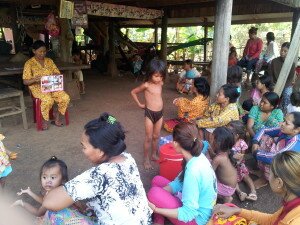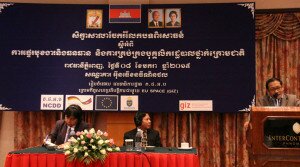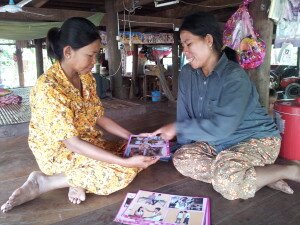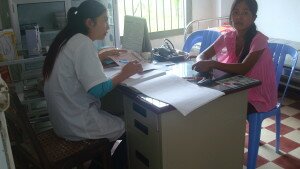Indonesia and the Philippines share experiences on the process of functional and resource transfer to sub-national administration
Phnom Penh, two experts from Indonesia and the Philippines shared their experiences on how responsibilities for basic service delivery have been transferred with the necessary financial and personnel resources to local governments in their countries with various Ministries and representatives of sub-national administrations in Cambodia. More >>>
Village health volunteer educates pregnant women on antenatal care and birth
By Navy Kieng

© UNICEF Cambodia/2014/Navy Kieng
Mrs. Sophy, the village health volunteer, explains pregnancy to women in her village.
16 February 2015
Kampong Thom, Cambodia, 2 September 2014 – In the remote Cambodian village of Porproak, mothers and pregnant women sit quietly on the ground under a wooden house listening intently at a session organised by village health volunteer, Mrs. Sophy. On a chair in front of the group she holds up pictures and explains what antenatal care services are, and how to prepare for birth. When she asks what the women learned from the session, it is amazing to see her audience enthusiastically engage with each other to provide the answers. More >>>
Indonesia and the Philippines share experiences on the process of functional and resource transfer to sub-national administration
Phnom Penh, two experts from Indonesia and the Philippines shared their experiences on how responsibilities for basic service delivery have been transferred with the necessary financial and personnel resources to local governments in their countries with various Ministries and representatives of sub-national administrations in Cambodia. “There are good experiences in ASEAN countries and Cambodia should learn from those countries”, underlined H.E. Sak Setha, Secretary of State, Ministry of Interior and Head of NCDD Secretariat. The Secretariat of the National Committee for Sub-National Democratic Development (NCDD), which is responsible for coordinating the government wide democratic decentralization reform in Cambodia, had invited the regional experts to inform the efforts of the Royal Government in this regard. The expert visit was facilitated by the NCDD Secretariat in cooperation with the joint European Programme for “Strengthening Performance, Accountability and Civic Engagement of Democratic Councils in Cambodia” (EU SPACE), which is implemented by GIZ. Read more at the NCDD website in English or in Khmer.
![]()




